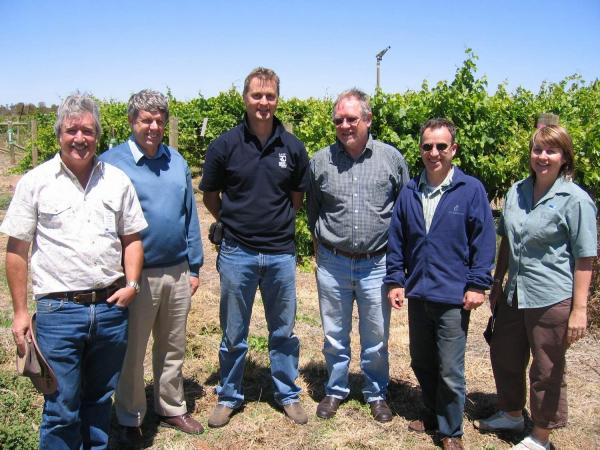
© 2009-2012 CRC for National Plant Biosecurity | Disclaimer
![]()


 The Australian viticulture industry exports wine to more than 100 countries worldwide and contributes approximately $5.5 billion dollars to the nation’s economy. The impact of an incursion of an exotic disease/pest would have a devastating effect on the wine industry, and Australia’s export market.
The Australian viticulture industry exports wine to more than 100 countries worldwide and contributes approximately $5.5 billion dollars to the nation’s economy. The impact of an incursion of an exotic disease/pest would have a devastating effect on the wine industry, and Australia’s export market.
The current strategy for managing such an incursion includes complete removal of affected and suspected plants, followed by burning and/or burial. These eradication methods can incur significant costs to growers and the industry. The time taken to re-establish a vineyard to its previous level of economic production, following removal, can be many years. This is particularly devastating for wine connoisseurs who enjoy a glass of premium Shiraz produced from 100-year-old vines.
As part of our Impact Management Research Program, we are developing alternative strategies to optimise the eradication process and minimise the economic cost of returning the crop to its previous quality and production. If successful, this research has potential to save the Australian wine industry millions of dollars if there was an exotic disease incursion.
While the cold seasons are synonymous with fires and full-bodied red wines, this winter our researchers will be drastically pruning vines using a strict protocol. The vines will then be subjected to conditions conducive for disease development and assessed for reoccurrence of disease. This will determine the success of eradication in treated vines compared to control vines, which will be managed using standard pruning practices. Sentinel vines in pots will be placed strategically within and around the trial site during spring to detect any cross-contamination between treatments or external infection.
Once the protocol has been assessed and validated, the knowledge will be used to refine the drastic pruning protocol for use by Australian authorities. Our research has the potential to save the wine industry millions of dollars in lost production and quality in the case of an exotic pathogen incursion. Further research could potentially evaluate this eradication protocol on other high priority exotic diseases that threaten high value grapevines.
CRCNPB Eradication Research Team
L to R: Professor Wayne Wilcox (Cornell University USA), Dr Bob Emmett (DPI Vic), Dr Mark Sosnowski - Project Leader (SARDI), Dr Trevor Wicks (SARDI), Dr David Eagling (CRCNPB) and Ms Kathy Clarke (DPI Vic)